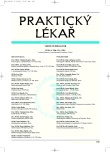Testosterone replacement therapy in aging men.
Substituční léčba testosteronem u mužů v andropauze
Americká endokrinologická společnost pověřila výbor odborníků shrnutím dosažitelných důkazů pro testosteronovou terapii hypogonadismu u mužů a formulací příslušných doporučení. Náhradní testosteronová léčba u stárnoucích mužů je doporučována jen mužům s evidentními symptomy hypogonadismu a androgenní nedostatečností, kteří mají celkový testosteron při opakovaných ranních měřeních v subnormálním rozmezí. Bylo však konstatováno, že přínos testosteronové náhradní terapie u stárnoucích mužů k udržení sekundárních sexuálních znaků, zlepšení sexuálních funkcí, pocitu dobré pohody, svalové hmoty a síly a denzity kostního minerálu byl dosud prokázán jen nedostatečně. Byly také shrnuty poznatky o možných nežádoucích účincích léčby testosteronem u starších mužů, z nichž jsou zaznamenány významně častěji detekce onemocnění prostaty a zvýšení hematokritu. Má-li být testosteronová léčba zaváděna, je v této kategorii v úvahách o jejich výsledcích třeba počítat nejen s jejími benefity, ale i se zátěží pacienta spojenou s podáváním testosteronu a monitorováním léčby, podobně jako s náklady na ni, a s možnými dosud nepoznanými dlouhodobými riziky.
Klíčová slova:
stárnoucí muži, andropauza, testosteron, rizika terapie.
Authors:
L. Stárka
Authors‘ workplace:
Ředitel: doc. MUDr. Vojtěch Hainer, CSc.
; Endokrinologický ústav, Praha
Published in:
Prakt. Lék. 2007; 87(3): 184-188
Category:
Therapy
Overview
The Endocrine Society’s (USA) Clinical Guidelines Subcommittee reviewed the available evidence for recommendations for testosterone therapy in hypogonadal men. Testosterone replacement for aging men is only recommended for men with symptoms of hypogonadism and with androgen deficiency who have low total testosterone levels in repeat measurements of its morning level. However, in aging men the benefit of testosterone replacement for maintaining secondary sex characteristics, and improving sexual function, sense of well-being, muscle mass and strength, and bone mineral density has not yet been fully investigated. The potential adverse effects of testosterone therapy in aging men, especially the more frequent detection of prostate diseases or erythrocytosis, are listed. In cases where testosterone therapy is being considered, the benefits of the treatment should be compared with the burden of testosterone administration and monitoring therapy, the costs of the procedure and possible costs incurred as a result of potential unknown long-term risks.
Key words:
aging men, andropause, testosterone, adverse outcomes.
Labels
General practitioner for children and adolescents General practitioner for adultsArticle was published in
General Practitioner

2007 Issue 3
- Advances in the Treatment of Myasthenia Gravis on the Horizon
- Hope Awakens with Early Diagnosis of Parkinson's Disease Based on Skin Odor
- Memantine in Dementia Therapy – Current Findings and Possible Future Applications
- Memantine Eases Daily Life for Patients and Caregivers
- Possibilities of Using Metamizole in the Treatment of Acute Primary Headaches
-
All articles in this issue
- An asymptomatic form of primary hyperparathyroidism – accidental finding.
- Thyroid cancer and malignant lymphoma – is there a relationship?
- Spectral analysis of heart rate variability in persons with mild subclinical hypothyroidism
- Testosterone replacement therapy in aging men.
- Physical activity and obesity.
- The treatment of obesity – Current trends and future perspectives
- Thyroid disease in the GP’s practice
- Glycaemic index of carbohydrates – relation to obesity.
- Health Spa weight management and its influence on anthropometric, psychobehavioural and hormonal indices
- Implication of molecular genetic examination in a three generational family with multiple endocrine neoplasia type 2A
- Diabetes mellitus type 1 (DM 1) and autoimmune thyroiditis as a complication of Interferon alpha treatment.
- The day to day life of Czech diabetic patients: Psychosomatic problems of diabetes.
- Drug-induced gynecomastia
- Autoimmune polyglandular syndrome type 2 in the general practitioner’s surgery.
- ACTH-dependent Cushing’s syndrome due to a carcinoid tumour Cushing’s
- General Practitioner
- Journal archive
- Current issue
- About the journal
Most read in this issue
- Testosterone replacement therapy in aging men.
- Drug-induced gynecomastia
- ACTH-dependent Cushing’s syndrome due to a carcinoid tumour Cushing’s
- Thyroid cancer and malignant lymphoma – is there a relationship?
